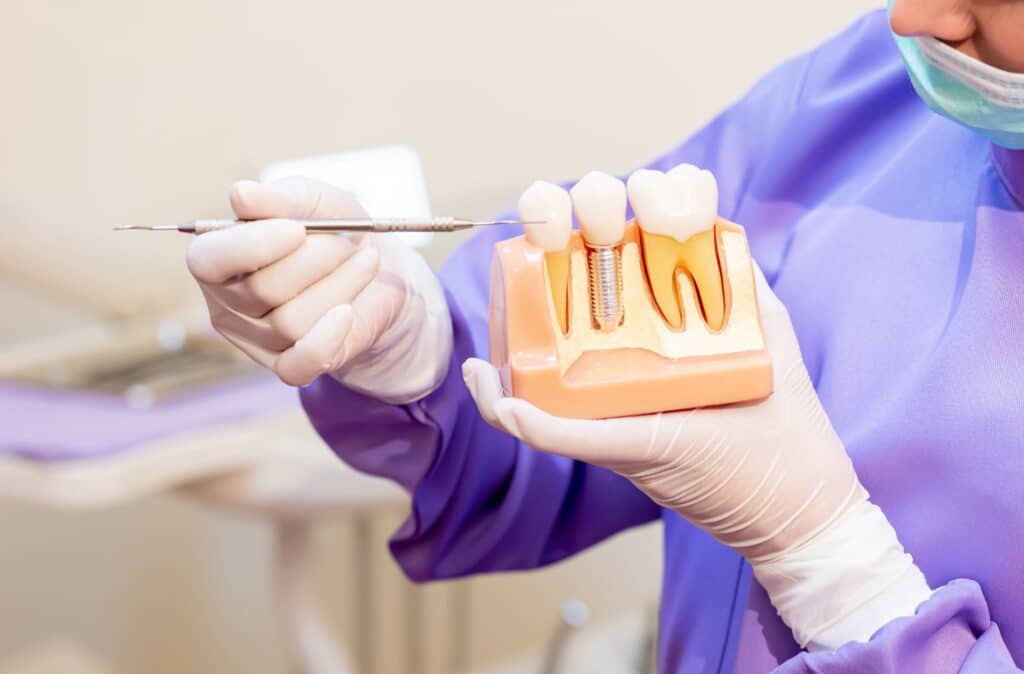Dental implant surgery is a reliable way to replace missing teeth. It offers a durable, natural-looking solution that significantly improves oral health and confidence. Understanding what to expect during the procedure can help alleviate anxiety and prepare you for a smooth experience.
Getting a dental implant is an important decision that can significantly enhance your quality of life. By understanding the preparation, steps involved, immediate post-surgery expectations, and recovery process, you can approach the surgery with confidence and ease. Let’s delve into what you need to know to be well-prepared for your dental implant procedure.
Preparing for Dental Implant Surgery
Before your dental implant surgery, there are several essential steps to take. First, your dentist will conduct a thorough exam. This will involve X-rays and possibly 3D scans of your jaw. The goal is to get a detailed view of your mouth and bone structure, ensuring the best placement for the implant.
You will also discuss your medical history. You must inform your dentist about any medications you’re taking and your health conditions. This helps prevent complications during and after surgery. If you have any anxiety about the procedure, ask about sedation options. Many patients find that sedation helps them feel more relaxed and comfortable.
Preparing also means making plans for after the surgery. Arrange someone to drive you home because you might feel groggy from the sedation. Stock up on soft foods like yogurt, applesauce, and soups that are easy to eat while your mouth heals. These steps will help ensure you are well-prepared for your upcoming dental implant surgery.
The Steps Involved in the Surgery
Dental implant surgery occurs in several stages. Knowing these steps can help you feel more at ease. Here’s a general overview of what happens:
1. Initial Incision:
The first step involves numbing the area with local anesthesia. Your dentist will make a small incision in your gum to expose the bone where the implant will be placed.
2. Bone Preparation:
A special drill creates a small hole in the jawbone, where the titanium implant post will go. Precision is critical to ensuring a secure fit.
3. Placing the Implant:
The titanium post, which acts as the artificial root, is screwed into the jawbone. This post will eventually hold the replacement tooth.
4. Bone Integration:
After the post is placed, your gum is stitched up, and you’ll be given time to heal. During this period, the implant integrates with the bone in osseointegration, which can take a few months.
5. Attaching the Abutment:
Once the implant fuses with the bone, another minor surgery attaches a small connector called an abutment to the post. This will hold the artificial tooth.
6. Placing the Crown:
The final step involves attaching the new tooth, or crown, to the abutment. The crown is custom-made to match the colour and shape of your natural teeth, ensuring a perfect fit.
Each of these steps is crucial to the success of your dental implant. By understanding the process, you can mentally and physically prepare for each journey phase.
What to Expect Immediately After Surgery
You’ll start your recovery process once your dental implant surgery is complete. It’s normal to have some swelling and discomfort in the area where the implant was placed. Your dentist will likely prescribe pain medication to help manage any pain. Over-the-counter pain relief options like ibuprofen may also be recommended.
You may have minor bleeding, which should gradually decrease over the first 24 hours. Using gauze pads and applying gentle pressure can help control it. It’s important to stay upright and avoid strenuous activities, which can increase swelling and bleeding.
Ice packs can reduce swelling. Apply an ice pack to the cheek near the surgery site for 15 minutes, with breaks in between. Follow your dentist’s instructions, including when you can eat and drink. You’ll likely be advised to stick to soft foods and liquids for the first few days.
Recovery and Post-Operative Care
Proper aftercare is crucial for successful recovery and the long-term success of your dental implants. Here are some critical steps for post-operative care:
1. Follow-Up Visits:
Attending all follow-up appointments with your dentist is essential. These visits allow your dentist to monitor the healing process and ensure everything is going as expected.
2. Medication:
Take any prescribed antibiotics or pain medications as directed. This helps manage pain and prevents infection.
3. Oral Hygiene:
Keeping your mouth clean is essential to prevent infection. Brush your teeth gently and avoid the surgical site. You may be advised to use a special mouth rinse or saltwater rinses to keep the area clean.
4. Avoid Certain Foods:
For the first few days, stick to soft foods like yogurt, mashed potatoes, and smoothies. Avoid hot, spicy, or crunchy foods that could irritate the surgical area.
5. Rest:
Get plenty of rest to give your body time to heal. Avoid strenuous exercise for at least a few days after surgery.
Contact your dentist if you experience excessive bleeding, severe pain, or signs of infection, such as unusual swelling or fever.
Conclusion
Understanding the process and what to expect after dental implant surgery can help ease any concerns and prepare you for a smooth recovery. From immediate aftercare to long-term maintenance, following your dentist’s instructions is critical to the success of your implant. Whether it’s managing pain, keeping the surgical site clean, or attending follow-up appointments, each step is essential in ensuring your new implant integrates well and functions like a natural tooth.
Following the guidelines and caring for your new implant will help you achieve a healthy and beautiful smile. Don’t hesitate to reach out if you’re considering dental implants or have questions. Schedule a consultation with Pickering Dental Services today and take the first step towards restoring your smile with confidence!



